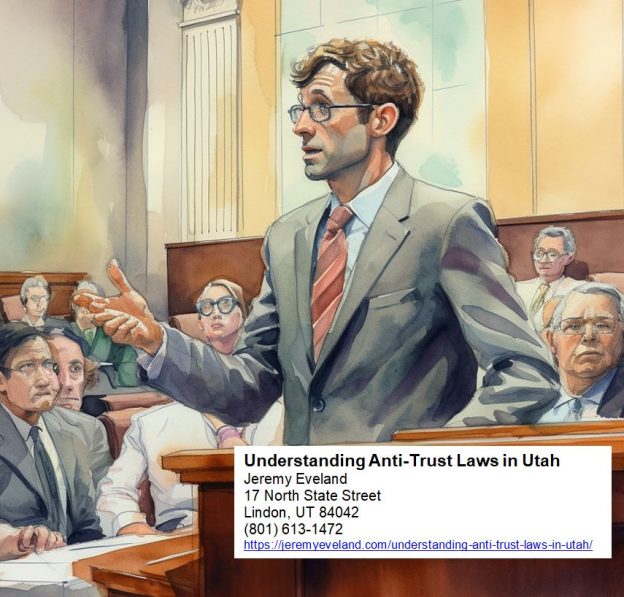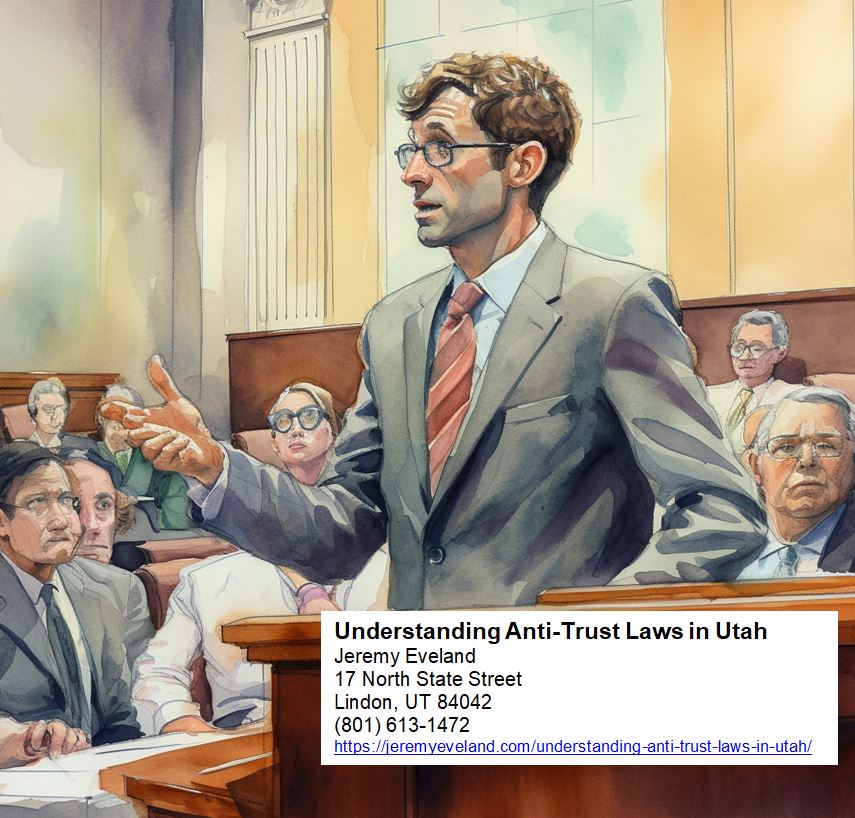This page is about Business Law.
In today’s highly competitive business landscape, it is crucial for companies to stay compliant with antitrust laws. These laws are designed to promote fair competition and prevent monopolistic practices that could harm consumers and hinder economic growth. Failure to comply with antitrust laws can lead to severe consequences, including hefty fines and legal repercussions. As a business owner or executive, it is important to have a solid understanding of these laws to ensure that your company operates within the boundaries of the law. This article will provide you with valuable insights into antitrust laws and offer guidance on how to stay compliant, safeguarding your business and its reputation.

Understanding Antitrust Laws
Antitrust laws are legal regulations put in place to promote fair competition, prevent monopolies, and protect consumers in the business world. These laws are designed to ensure that businesses operate in a way that is fair and beneficial for both the market and consumers. By understanding antitrust laws, businesses can navigate the complex landscape of competition while avoiding legal issues and maintaining a level playing field.
What are Antitrust Laws?
Antitrust laws, also known as competition laws, are a set of statutes and regulations that aim to promote fair and open competition in the marketplace. These laws are intended to prevent businesses from engaging in activities that would harm competition, such as monopolizing the market, fixing prices, or colluding with other companies to gain an unfair advantage. Antitrust laws are enforced by government agencies, such as the Federal Trade Commission (FTC) and the Department of Justice (DOJ), and violations can result in severe penalties for businesses.
Types of Antitrust Laws
There are several types of antitrust laws that cover different aspects of competition and business practices. Some of the key types of antitrust laws include:
- Price Fixing and Collusion: These laws prohibit businesses from conspiring with competitors to fix prices or manipulate the market in order to gain an unfair advantage. Price fixing is considered a serious antitrust violation and can lead to significant penalties.
- Market Allocation: Antitrust laws also prohibit businesses from allocating markets or customers with their competitors. This means that companies cannot enter into agreements that divide territories or customers among themselves in a way that restricts competition.
- Tying Arrangements: Tying arrangements occur when a business requires a customer to purchase one product or service as a condition for purchasing another product or service. Antitrust laws prohibit tying arrangements that are designed to restrict competition or create a monopoly.
- Vertical Restraints: These laws focus on the relationship between different levels of the supply chain, such as manufacturers and retailers. Vertical restraints include practices such as exclusive dealing agreements, resale price maintenance, and franchising restrictions, which can limit competition and harm consumers.
- Horizontal Mergers and Acquisitions: Antitrust laws also regulate mergers and acquisitions that have the potential to reduce competition in the marketplace. Companies engaging in merger or acquisition activities must comply with certain requirements, such as notifying the antitrust authorities and demonstrating that the transaction will not harm competition.
Importance of Antitrust Laws in Business
Antitrust laws play a critical role in maintaining a healthy and competitive business environment. These laws are essential for several reasons:
- Promoting Fair Competition: Antitrust laws ensure that businesses compete on a level playing field, which encourages innovation, quality, and fair pricing. When companies are allowed to engage in unfair practices, such as price fixing or monopolization, it can harm consumers and stifle economic growth.
- Preventing Monopolies: Antitrust laws are designed to prevent the formation of monopolies or the abuse of market power. Monopolies can lead to higher prices, reduced choice for consumers, and a lack of innovation. By preventing the concentration of power in the hands of a few companies, antitrust laws help maintain a competitive marketplace.
- Protecting Consumers: Antitrust laws aim to protect consumers by promoting fair pricing, quality products, and a wide variety of choices. When businesses engage in anticompetitive behavior, it can lead to higher prices, limited options for consumers, and reduced quality. Antitrust laws help ensure that consumers have access to competitive markets and the best products and services.
By adhering to antitrust laws, businesses can not only avoid legal issues and penalties but also build a reputation for fair and ethical practices. Compliance with these laws is crucial for businesses to succeed in the long term.
Antitrust Laws and Competition
Promoting fair competition is one of the key goals of antitrust laws. By creating an environment where businesses are free to compete on their merits, these laws ensure that consumers have access to the best products and services at fair prices. Antitrust laws also play a crucial role in preventing monopolies, which can stifle competition and harm consumers. Additionally, these laws provide protection for consumers by regulating business practices that can lead to anticompetitive behavior.
Promoting Fair Competition
Antitrust laws are designed to promote fair competition in the marketplace. They ensure that businesses have an equal opportunity to succeed based on the quality of their products, services, and pricing. When businesses compete on a level playing field, it leads to innovation, lower prices, and better quality products for consumers. Antitrust laws prohibit unfair practices such as price fixing, bid rigging, and market allocation, which can distort competition and harm consumers.
Preventing Monopolies
One of the primary goals of antitrust laws is to prevent the formation of monopolies or the abuse of market power by dominant companies. A monopoly occurs when a single company controls a significant portion of the market and has the power to set prices and dictate terms without facing significant competition. Antitrust laws prohibit anticompetitive behavior, such as mergers or acquisitions that could lead to a monopoly, and provide mechanisms to break up existing monopolies. By preventing the concentration of power in the hands of a few companies, antitrust laws ensure that competition remains strong, leading to better outcomes for consumers.
Protecting Consumers
Antitrust laws play an important role in protecting consumers from anticompetitive practices that can harm their interests. These laws ensure that consumers have access to a wide range of choices, competitive prices, and quality products and services. By prohibiting practices such as price fixing, tying arrangements, and collusive behavior, antitrust laws help maintain a competitive marketplace where businesses are incentivized to provide the best value to consumers. By promoting fair competition and preventing abuses of market power, antitrust laws contribute to consumer welfare and ensure the availability of quality products and services at competitive prices.
In conclusion, antitrust laws are essential for promoting fair competition, preventing monopolies, and protecting consumers. By adhering to these laws, businesses can ensure a level playing field, foster innovation, and provide consumers with the best products and services at fair prices.
Key Provisions of Antitrust Laws
Antitrust laws encompass several key provisions that govern business conduct and aim to promote fair competition, prevent anticompetitive practices, and protect consumers. Understanding these provisions is crucial for businesses to stay compliant and avoid potential legal issues. Some of the key provisions include price fixing and collusion, market allocation, tying arrangements, vertical restraints, and horizontal mergers and acquisitions.
Price Fixing and Collusion
Price fixing and collusion are serious antitrust violations that involve businesses conspiring with competitors to fix prices or manipulate the market in their favor. Price fixing occurs when competitors agree to set prices at a certain level, eliminating competition and harming consumers. Collusion involves businesses cooperating instead of competing, which can lead to higher prices and reduced options for consumers. Antitrust laws prohibit price fixing and collusion to ensure fair pricing and maintain a competitive marketplace.
Market Allocation
Market allocation refers to agreements between competitors to divide markets or customers among themselves, limiting competition and potentially creating a monopoly. These agreements can be formal or informal and can include allocating territories, customers, or product lines. Antitrust laws prohibit market allocation to ensure a level playing field for businesses and protect consumer choice.
Tying Arrangements
Tying arrangements occur when a business requires a consumer or customer to purchase one product or service as a condition for purchasing another product or service. This can harm competition by restricting consumer choice and creating barriers to entry for competitors. Antitrust laws prohibit tying arrangements that are designed to restrain trade or create a monopoly.
Vertical Restraints
Vertical restraints are agreements or practices that exist between businesses at different levels of the supply chain, such as between manufacturers and retailers. These restraints can include exclusive dealing agreements, resale price maintenance, and franchising restrictions. Antitrust laws regulate vertical restraints to prevent anticompetitive behavior and ensure fair competition.
Horizontal Mergers and Acquisitions
When businesses merge or acquire each other at the same level of the supply chain, it is known as a horizontal merger or acquisition. Antitrust laws regulate these transactions to prevent the reduction of competition and potential harm to consumers. Companies engaging in horizontal mergers or acquisitions must comply with certain requirements, such as notifying the antitrust authorities and demonstrating that the transaction will not harm competition.
Understanding these key provisions of antitrust laws is essential for businesses to ensure compliance and avoid potential violations. By adhering to these provisions, businesses can contribute to a fair and competitive marketplace that benefits both businesses and consumers.
Consequences of Antitrust Violations
Violation of antitrust laws can have severe consequences for businesses, including civil and criminal penalties, as well as private lawsuits. It is essential for businesses to understand the potential consequences of antitrust violations and take proactive steps to ensure compliance.
Civil Penalties
When businesses violate antitrust laws, they can face civil penalties, which are imposed by government agencies such as the Federal Trade Commission (FTC) or the Department of Justice (DOJ). Civil penalties can include fines, injunctive relief, and ongoing oversight by regulatory authorities. The amount of civil penalties can vary depending on the nature of the violation and the impact on competition.
Criminal Penalties
In addition to civil penalties, antitrust violations can also lead to criminal penalties, which are enforced by the DOJ. Criminal penalties can include fines and imprisonment for individuals involved in the violation. The severity of criminal penalties depends on the nature and extent of the violation, and individuals can face significant consequences for their involvement in antitrust violations.
Private Lawsuits
Antitrust violations can also expose businesses to private lawsuits filed by other businesses or consumers who have been harmed by anticompetitive behavior. Private lawsuits can result in monetary damages, injunctive relief, and legal costs. It is crucial for businesses to understand that antitrust violations not only carry the risk of government enforcement but also expose them to potential legal action from affected parties.
By complying with antitrust laws, businesses can avoid potential consequences and maintain a reputation for fair and ethical practices. Implementing strong antitrust compliance programs and conducting regular training for employees can help businesses minimize the risk of antitrust violations and protect themselves from legal liabilities.

Ensuring Antitrust Compliance
To ensure compliance with antitrust laws, businesses should implement strong corporate policies, conduct regular compliance training, monitor and audit their activities, and establish internal reporting mechanisms. By taking proactive steps, businesses can minimize the risk of antitrust violations and create a culture of compliance within their organizations.
Creating Strong Corporate Policies
Businesses should develop and implement comprehensive antitrust compliance policies that outline the expected behavior and practices related to competition. These policies should clearly articulate the importance of compliance with antitrust laws and provide guidance to employees on how to identify and avoid potential antitrust issues. Strong corporate policies help establish a culture of compliance and set the tone from the top.
Conducting Regular Compliance Training
Regular compliance training is essential to educate employees about antitrust laws and ensure they understand their responsibilities in promoting fair competition and avoiding anticompetitive behavior. Training sessions should cover key provisions of antitrust laws, potential risk areas, and best practices to ensure compliance. By providing employees with the necessary knowledge and skills, businesses can mitigate the risk of unintentional antitrust violations.
Monitoring and Auditing
Businesses should have robust monitoring and auditing processes in place to assess compliance with antitrust laws. Regular internal audits can help identify potential violations, assess the effectiveness of compliance programs, and identify areas for improvement. Monitoring activities, including reviewing sales and marketing practices, can help detect any suspicious behavior or potential violations.
Internal Reporting Mechanisms
Establishing internal reporting mechanisms, such as hotlines or confidential reporting systems, is critical to encourage employees to report potential antitrust violations. Employees should feel safe and empowered to report any concerns or suspicious activities without fear of retaliation. Timely reporting and investigation of potential violations can help businesses address issues proactively and minimize the risk of legal consequences.
By implementing these measures, businesses can create a robust compliance framework that fosters a culture of compliance and minimizes the risk of antitrust violations. However, it is essential to remember that compliance with antitrust laws is an ongoing process that requires constant monitoring, evaluation, and adaptation to changing legal and regulatory landscapes.
Antitrust Compliance Programs
Developing an effective compliance program is crucial for businesses to ensure adherence to antitrust laws and mitigate the risk of antitrust violations. A comprehensive antitrust compliance program should include assigning responsibility and accountability, establishing clear policies and procedures, educating employees about antitrust laws, and implementing monitoring and reporting mechanisms.
Assigning Responsibility and Accountability
The first step in developing an effective antitrust compliance program is to assign responsibility and accountability for compliance within the organization. This includes designating a compliance officer or team responsible for overseeing antitrust compliance efforts. The compliance officer or team should have the necessary expertise and authority to implement and enforce the compliance program effectively.
Establishing Clear Policies and Procedures
Clear and well-defined policies and procedures are essential components of an antitrust compliance program. These policies should clearly articulate the organization’s commitment to compliance with antitrust laws and provide guidance to employees on how to identify and address potential antitrust issues. Procedures should outline steps to be followed in specific situations to ensure consistent and appropriate responses to potential violations.
Educating Employees about Antitrust Laws
Education and training are critical to ensuring that employees understand their responsibilities under antitrust laws and are equipped to identify and prevent potential violations. Businesses should provide regular training sessions that cover key provisions of antitrust laws, potential risk areas, and best practices for compliance. Training should be tailored to different employee roles and responsibilities to address specific challenges and risks they may face.
Monitoring and Auditing
Monitoring and auditing are vital components of an effective antitrust compliance program. Regular internal audits can help identify potential violations, assess the effectiveness of compliance efforts, and identify areas for improvement. Monitoring activities, such as reviewing sales and marketing practices, can help detect any suspicious behavior or potential violations. By implementing these measures, businesses can ensure ongoing compliance with antitrust laws.
Internal Reporting Mechanisms
Establishing internal reporting mechanisms, such as hotlines or confidential reporting systems, is crucial to encourage employees to report potential antitrust violations. Employees should feel safe and empowered to report any concerns or suspicious activities without fear of retaliation. Timely reporting and investigation of potential violations can help businesses address issues proactively and minimize the risk of legal consequences.
By developing and implementing a comprehensive antitrust compliance program, businesses can demonstrate their commitment to adhering to antitrust laws and create a culture of compliance within their organizations. A strong compliance program not only helps mitigate the risk of antitrust violations but also protects businesses from legal liabilities and reputational damage.
Antitrust Risk Assessments
Conducting regular antitrust risk assessments is an essential step for businesses to identify potential risk areas and assess compliance with antitrust laws. These assessments help businesses understand their exposure to antitrust risks and develop strategies to mitigate those risks and ensure compliance. By proactively identifying and addressing potential issues, businesses can minimize the risk of antitrust violations and protect themselves from legal liabilities.
Identifying Potential Risk Areas
Antitrust risk assessments begin with identifying potential risk areas within the organization. This involves evaluating business practices and operations to identify any activities that could potentially violate antitrust laws. Key areas to consider include pricing strategies, competition with competitors, relationships with suppliers and distributors, and participation in industry trade associations.
Conducting Internal Audits
Internal audits play a crucial role in antitrust risk assessments by evaluating compliance with antitrust laws and identifying potential violations. Audits should assess whether business practices and policies align with antitrust laws and identify any gaps or areas of concern. Internal audits can also help evaluate the effectiveness of existing compliance programs and identify opportunities for improvement.
Assessing Competitive Behavior
Assessing competitive behavior is an essential aspect of antitrust risk assessments. This involves evaluating how the organization competes in the marketplace and whether its practices comply with antitrust laws. Areas to assess include pricing strategies, terms and conditions of sale, exclusive distribution practices, and relationships with competitors.
Reviewing Marketing and Sales Practices
Marketing and sales practices are another crucial area to review during antitrust risk assessments. This includes evaluating advertising, promotional activities, and sales practices to ensure compliance with antitrust laws. Assessments should focus on potential issues such as false or misleading advertising, deceptive pricing, and unfair competition.
By conducting regular antitrust risk assessments, businesses can identify potential issues and take proactive steps to address them. This not only helps mitigate the risk of antitrust violations but also demonstrates a commitment to fair and ethical business practices.
Antitrust Investigations
In the event of government inquiries or investigations into potential antitrust violations, businesses must be prepared to respond appropriately and comply with investigative authorities. Antitrust investigations can be complex and time-consuming, requiring careful navigation and cooperation to protect the interests of the business. Understanding the key steps involved in antitrust investigations can help businesses effectively respond to inquiries and minimize potential legal consequences.
Responding to Government Inquiries
When a government agency initiates an inquiry or investigation into potential antitrust violations, it is essential for businesses to respond in a timely and cooperative manner. This involves providing requested information, documents, and any other relevant materials that are within the scope of the inquiry. It is crucial to seek legal counsel at this stage to ensure compliance with legal requirements and to protect the business’s interests.
Cooperating with Investigative Authorities
Cooperation with investigative authorities is critical during antitrust investigations. This includes promptly responding to requests for information, participating in interviews or depositions, and providing any necessary cooperation to facilitate the investigation. Cooperating with authorities can help businesses build credibility and potentially reduce any penalties or legal consequences.
Preserving Documents and Evidence
Preserving relevant documents and evidence is essential during antitrust investigations. Businesses must implement measures to ensure the preservation of electronic and physical records that may be requested by investigative authorities. Failure to preserve documents and evidence can result in adverse legal consequences, including spoliation sanctions.
Seeking Legal Representation
Engaging legal representation is crucial when facing antitrust investigations. Experienced antitrust attorneys can guide businesses through the investigation process, advise on legal requirements and obligations, and protect the business’s interests throughout the investigation. Legal representation ensures that businesses have a thorough understanding of their rights and responsibilities and can navigate the complex legal landscape effectively.
By responding appropriately and cooperating with investigative authorities, businesses can demonstrate their commitment to compliance and potentially mitigate the impact of antitrust investigations. Seeking legal representation ensures that businesses have the necessary support and expertise to navigate the investigation process and protect their interests.

Antitrust Compliance in Mergers and Acquisitions
Antitrust compliance is a critical consideration during mergers and acquisitions to ensure that the transaction does not result in a reduction of competition or potential harm to consumers. Businesses engaging in mergers and acquisitions must navigate complex antitrust review processes, comply with pre-merger notification requirements, analyze potential competitive implications, and negotiate remedies, if necessary.
Pre-Merger Notification Requirements
Before engaging in a merger or acquisition, businesses must comply with pre-merger notification requirements set forth by the antitrust authorities. These requirements vary depending on the jurisdiction and the size of the transaction, but typically involve filing a notification and providing requested information to antitrust agencies. Failure to comply with pre-merger notification requirements can result in significant legal consequences and delays in completing the transaction.
Analyzing Potential Competitive Implications
Businesses engaging in mergers and acquisitions must analyze the potential competitive implications of the transaction. This involves evaluating market concentration, potential barriers to entry, and the impact on competition and consumers. Antitrust authorities typically review these factors to assess whether the transaction will harm competition or consumers.
Negotiating Remedies
In some cases, antitrust authorities may have concerns about the potential anticompetitive effects of a merger or acquisition. To address these concerns, businesses may need to negotiate remedies, such as divestitures or behavioral commitments, to alleviate the antitrust authorities’ concerns while still completing the transaction. Negotiating remedies can be a complex process that requires careful consideration of the business’s objectives and the potential impact on the transaction.
Navigating Complex Antitrust Review Processes
Navigating the complex antitrust review processes can be challenging, particularly for large and complex mergers and acquisitions. It is essential for businesses to engage antitrust counsel early in the process to ensure compliance with legal requirements and to navigate the review process effectively. Antitrust attorneys can provide guidance on the specific requirements and processes involved and help identify potential antitrust issues and strategies to address them.
By ensuring antitrust compliance during mergers and acquisitions, businesses can minimize the risk of regulatory intervention, legal consequences, and delays in completing the transaction. Engaging antitrust counsel can provide businesses with the necessary expertise and support to navigate the complex antitrust review processes effectively.
FAQs about Antitrust Compliance
What are the penalties for antitrust violations?
Antitrust violations can result in severe penalties, including civil and criminal fines, injunctive relief, ongoing regulatory oversight, and potential imprisonment for individuals involved in the violation. The amount of fines and penalties can vary depending on the nature and extent of the violation.
How can a business ensure antitrust compliance?
Businesses can ensure antitrust compliance by implementing strong corporate policies, conducting regular compliance training, monitoring and auditing their activities, and establishing internal reporting mechanisms. By taking proactive steps, businesses can minimize the risk of antitrust violations and create a culture of compliance within their organizations.
Can individual employees be held liable for antitrust violations?
Yes, individual employees can be held liable for antitrust violations. The individuals involved in antitrust violations, such as price fixing or collusion, can face criminal penalties, including fines and imprisonment. It is crucial for businesses to educate their employees about antitrust laws and the potential consequences of non-compliance.
What is the role of antitrust laws in preventing monopolies?
Antitrust laws play a crucial role in preventing monopolies by prohibiting activities that could lead to the concentration of market power in the hands of a few companies. By preventing monopolies, antitrust laws help maintain a competitive marketplace, which benefits consumers through lower prices, greater choice, and increased innovation.
Are there any exemptions to antitrust laws?
Antitrust laws generally do not provide explicit exemptions. However, certain collaborative activities, such as joint ventures or research and development collaborations, may qualify for legal immunity or safe harbor protection if they meet specific criteria under antitrust laws. It is essential to seek legal advice to determine whether a particular activity qualifies for an exemption or safe harbor protection.
If you need an attorney in Utah, you can call for free consultation:
Jeremy Eveland
8833 South Redwood Road
West Jordan, Utah 84088
(801) 613-1472
https://jeremyeveland.com






















